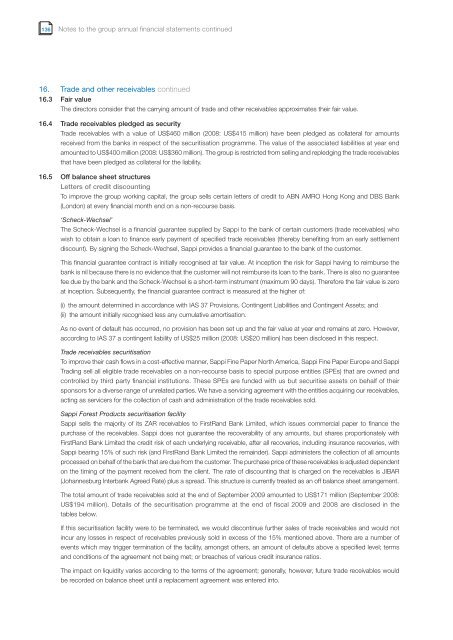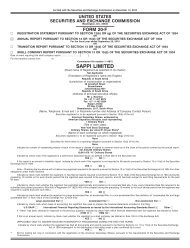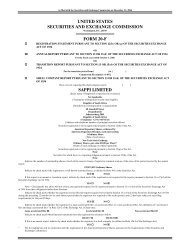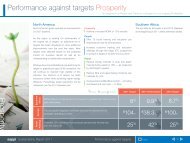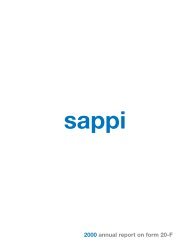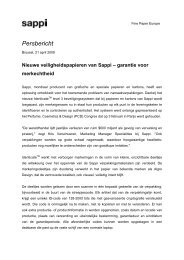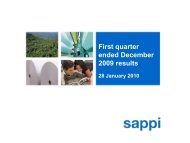Our performance in 2009 - Sappi
Our performance in 2009 - Sappi
Our performance in 2009 - Sappi
You also want an ePaper? Increase the reach of your titles
YUMPU automatically turns print PDFs into web optimized ePapers that Google loves.
136<br />
Notes to the group annual f<strong>in</strong>ancial statements cont<strong>in</strong>ued<br />
16. Trade and other receivables cont<strong>in</strong>ued<br />
16.3 Fair value<br />
The directors consider that the carry<strong>in</strong>g amount of trade and other receivables approximates their fair value.<br />
16.4 Trade receivables pledged as security<br />
Trade receivables with a value of US$460 million (2008: US$415 million) have been pledged as collateral for amounts<br />
received from the banks <strong>in</strong> respect of the securitisation programme. The value of the associated liabilities at year end<br />
amounted to US$400 million (2008: US$360 million). The group is restricted from sell<strong>in</strong>g and repledg<strong>in</strong>g the trade receivables<br />
that have been pledged as collateral for the liability.<br />
16.5 Off balance sheet structures<br />
Letters of credit discount<strong>in</strong>g<br />
To improve the group work<strong>in</strong>g capital, the group sells certa<strong>in</strong> letters of credit to ABN AMRO Hong Kong and DBS Bank<br />
(London) at every f<strong>in</strong>ancial month end on a non-recourse basis.<br />
‘Scheck-Wechsel’<br />
The Scheck-Wechsel is a f<strong>in</strong>ancial guarantee supplied by <strong>Sappi</strong> to the bank of certa<strong>in</strong> customers (trade receivables) who<br />
wish to obta<strong>in</strong> a loan to f<strong>in</strong>ance early payment of specified trade receivables (thereby benefit<strong>in</strong>g from an early settlement<br />
discount). By sign<strong>in</strong>g the Scheck-Wechsel, <strong>Sappi</strong> provides a f<strong>in</strong>ancial guarantee to the bank of the customer.<br />
This f<strong>in</strong>ancial guarantee contract is <strong>in</strong>itially recognised at fair value. At <strong>in</strong>ception the risk for <strong>Sappi</strong> hav<strong>in</strong>g to reimburse the<br />
bank is nil because there is no evidence that the customer will not reimburse its loan to the bank. There is also no guarantee<br />
fee due by the bank and the Scheck-Wechsel is a short-term <strong>in</strong>strument (maximum 90 days). Therefore the fair value is zero<br />
at <strong>in</strong>ception. Subsequently, the f<strong>in</strong>ancial guarantee contract is measured at the higher of:<br />
(i) the amount determ<strong>in</strong>ed <strong>in</strong> accordance with IAS 37 Provisions, Cont<strong>in</strong>gent Liabilities and Cont<strong>in</strong>gent Assets; and<br />
(ii) the amount <strong>in</strong>itially recognised less any cumulative amortisation.<br />
As no event of default has occurred, no provision has been set up and the fair value at year end rema<strong>in</strong>s at zero. However,<br />
accord<strong>in</strong>g to IAS 37 a cont<strong>in</strong>gent liability of US$25 million (2008: US$20 million) has been disclosed <strong>in</strong> this respect.<br />
Trade receivables securitisation<br />
To improve their cash flows <strong>in</strong> a cost-effective manner, <strong>Sappi</strong> F<strong>in</strong>e Paper North America, <strong>Sappi</strong> F<strong>in</strong>e Paper Europe and <strong>Sappi</strong><br />
Trad<strong>in</strong>g sell all eligible trade receivables on a non-recourse basis to special purpose entities (SPEs) that are owned and<br />
controlled by third party f<strong>in</strong>ancial <strong>in</strong>stitutions. These SPEs are funded with us but securitise assets on behalf of their<br />
sponsors for a diverse range of unrelated parties. We have a servic<strong>in</strong>g agreement with the entities acquir<strong>in</strong>g our receivables,<br />
act<strong>in</strong>g as servicers for the collection of cash and adm<strong>in</strong>istration of the trade receivables sold.<br />
<strong>Sappi</strong> Forest Products securitisation facility<br />
<strong>Sappi</strong> sells the majority of its ZAR receivables to FirstRand Bank Limited, which issues commercial paper to f<strong>in</strong>ance the<br />
purchase of the receivables. <strong>Sappi</strong> does not guarantee the recoverability of any amounts, but shares proportionately with<br />
FirstRand Bank Limited the credit risk of each underly<strong>in</strong>g receivable, after all recoveries, <strong>in</strong>clud<strong>in</strong>g <strong>in</strong>surance recoveries, with<br />
<strong>Sappi</strong> bear<strong>in</strong>g 15% of such risk (and FirstRand Bank Limited the rema<strong>in</strong>der). <strong>Sappi</strong> adm<strong>in</strong>isters the collection of all amounts<br />
processed on behalf of the bank that are due from the customer. The purchase price of these receivables is adjusted dependent<br />
on the tim<strong>in</strong>g of the payment received from the client. The rate of discount<strong>in</strong>g that is charged on the receivables is JIBAR<br />
(Johannesburg Interbank Agreed Rate) plus a spread. This structure is currently treated as an off balance sheet arrangement.<br />
The total amount of trade receivables sold at the end of September <strong>2009</strong> amounted to US$171 million (September 2008:<br />
US$194 million). Details of the securitisation programme at the end of fiscal <strong>2009</strong> and 2008 are disclosed <strong>in</strong> the<br />
tables below.<br />
If this securitisation facility were to be term<strong>in</strong>ated, we would discont<strong>in</strong>ue further sales of trade receivables and would not<br />
<strong>in</strong>cur any losses <strong>in</strong> respect of receivables previously sold <strong>in</strong> excess of the 15% mentioned above. There are a number of<br />
events which may trigger term<strong>in</strong>ation of the facility, amongst others, an amount of defaults above a specified level; terms<br />
and conditions of the agreement not be<strong>in</strong>g met; or breaches of various credit <strong>in</strong>surance ratios.<br />
The impact on liquidity varies accord<strong>in</strong>g to the terms of the agreement; generally, however, future trade receivables would<br />
be recorded on balance sheet until a replacement agreement was entered <strong>in</strong>to.


